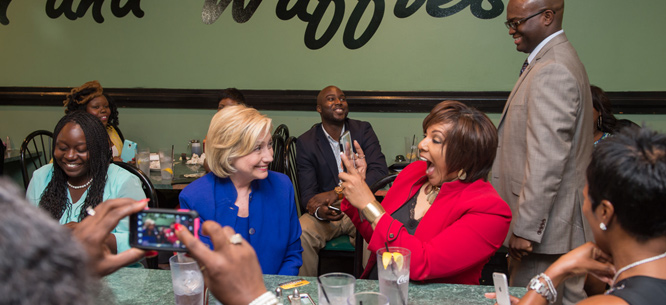South Carolina, Democratic Bellwether
South Carolina, Democratic Bellwether
South Carolina, and the South in general, has served as a bellwether for the Democratic Party’s presidential nomination since 1992.

The South Carolina Primary, scheduled for February 27, promises to be an important moment for the Democratic Party. According to the latest polls, African-American voters are poised to give Hillary Clinton a decisive victory over Bernie Sanders. Such a victory, the Clinton campaign has to hope, could give them some momentum headed into Super Tuesday on March 1. But on the ground in South Carolina, especially for many African-American voters, the campaign is not quite over.
African-American Democratic politicians have split between Sanders and Clinton. The most prominent Democrat in the state, Congressman James Clyburn, has endorsed Hillary Clinton. State legislators, however, are divided between the two candidates. Representative Joe Neal, a veteran in the South Carolina state legislature and the fourth-longest-serving member of that body, backs Sanders and came out for the candidate at the start of February. Representative Neal has, for years, been at the forefront of efforts to ensure accountability of police officers and to prevent racial discrimination. Representative Neal may be best known to non–South Carolinians for his leadership in taking down the Confederate flag last summer.
Younger Democrats, the future of an otherwise embattled political party, are lending their support to Senator Sanders. State representative Justin Bamberg—also the lawyer who represented the family of Walter Scott, who was killed by a police officer in North Charleston in 2015—has backed Sanders. So have state representatives Terry Alexander, Wendell Gilliard, and Robert Williams, all African-American Democrats. Members of the state Democratic Party and activists have also lent their name to the Sanders campaign. But most prominent Democrats back Clinton, and it remains to be seen how this will affect the Sanders campaign.
Nonetheless, the South Carolina primary has the potential to serve as a referendum on African-American support for the Democratic Party. Republicans of course long ago gave up on even trying to pursue African-American voters, instead adopting a “Southern Strategy” in the 1960s that became a national strategy by Ronald Reagan’s victory in 1980. Democrats, tied to the success of the civil rights movement, have become a de facto home for African-American political power. But such power comes with a responsibility for the party to respond to the needs of African-American voters. This means addressing economic inequality, civil rights, and a wide range of other issues—environmental justice, government spending, foreign policy—that impact the lives of African Americans.
South Carolina, and the South in general, has served as a bellwether for the Democratic Party’s presidential nomination since 1992. “Super Tuesday,” as we know it today, was born out of the belief that the Democratic Party had to start nominating more moderate candidates in order to have a fighting chance against a popular Republican Party in the 1980s. Although Jesse Jackson’s impressive 1988 victories in South Carolina, Georgia, Alabama, Mississippi, Louisiana, and Virginia ultimately ended in failure, recent Southern Democratic primary campaigns have been turning points for candidates who have then gone on to win the nomination. In 1992, Bill Clinton used Southern states to revitalize his campaign. In 2004, John Kerry’s victories in many Super Tuesday states, including Georgia, sealed his victory. Memorably, Barack Obama’s landslide victory in South Carolina during his 2008 run against Hillary Clinton was a sign that African-American voters believed he could win the nomination and the presidency.
This week, African-American radio stations have been filled with advertisements from both campaigns. Morgan Freeman has exhorted me to vote for Hillary Clinton because of her long record of aiding civil rights campaigns as a lawyer and senator. Other ads, including one from Spike Lee, have highlighted Bernie Sanders’ long record of civil rights activism. Still, African-American voters in the state want to take their time making their decisions. Last week, I went to get a haircut from my local barber. When I told him I was writing about the recent political history of the South, he began to ask me about the elections. African American, as I am, he admitted a reluctance to voting for Hillary Clinton, but was unsure of Bernie Sanders’ electability in the fall. I responded that Sanders was doing quite well in polls against Republican candidates, but that Clinton had on the whole shown considerable attentiveness to African Americans’ political concerns over the course of her campaign.
African-American voters in South Carolina know their importance to the party. Regardless of the results on Saturday, we must hope the party will reward that importance with action—not just campaign promises.
Robert Greene is a PhD student at the University of South Carolina and the book review editor for the Society of U.S. Intellectual Historians. His research focuses on the post-1965 history of African Americans and the American South.






